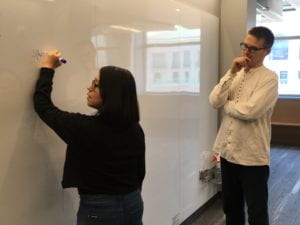We are delighted to announce that Elizabeth Mendoza, a junior student from Forest Hills High School (New York City borough of Queens) is joining BirdVox for a one-month research internship under the mentorship of Dr. Vincent Lostanlen, as part of the ARISE program at the NYU Tandon School of Engineering. Below is her research proposal.
ARISE (Applied Research Innovations in Science and Engineering) is an intensive program for academically strong, current 10th and 11th grade New York City students with a demonstrated interest in science, technology, engineering and math. More information on ARISE can be found at this address.

Synthesizing training data for automatic detection and classification of bird songs
Annual variations in the migratory routes of passerines is among the predominant markers of ecological disruption at temperate latitudes. Yet, although it is well established that migratory birds face an ever-increasing number of threats — including habitat loss, invasive species, and collisions with buildings or vehicles — little is known about the respective factors of risk influencing the abundancy of a given species at a fire spatiotemporal resolution. In this context, the deployment of an acoustic sensor network of autonomous recording units (ARU) offers an interesting trade-off between a relatively low cost and a highly informative output. Yet, despite the growing interest for bioacoustic analysis in avian ecology, the scalability of ARU deployment is currently hampered by the shortage of human experts that are trained to pinpoint and identify bird vocalizations in continuous audio recordings. In this context, closing the discrepancy between the cost of hardware ($1k/year) and the cost of human labor ($1M/year) is crucial to achieving the long-term goal of enabling the deployment of an acoustic sensor network for bird migration monitoring at the continental scale. One way to reduce this annotation overhead human experts by software. As the past years have witnessed a relative democratization of high-performance computing (HPC), it has become possible to design more ambitious software architectures, and notably deep learning, for large-scale automated species classification of bird songs and calls. The main contribution of this ARISE internship is to address the lack of diversity in training data in the context of avian flight call detection in audio. To this aim, the intern will synthesize artificial sound recordings containing bird calls, alongside a computer-generated annotation. The release of these synthetic recordings to the international research community could enable the deployment of larger deep learning models while avoiding statistical overfitting, by virtue of a source of training data that is virtually infinite.



